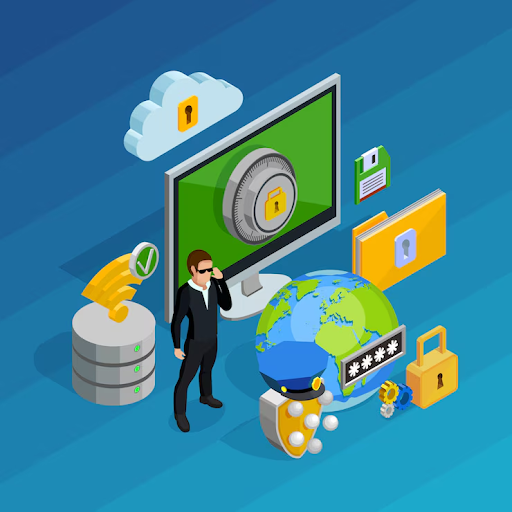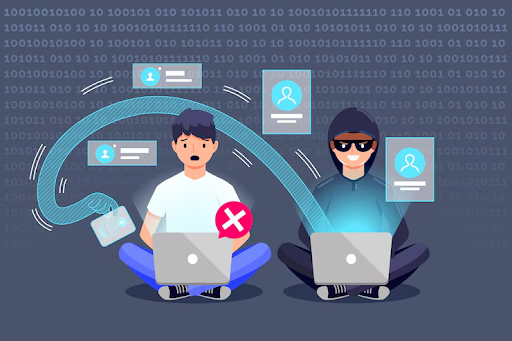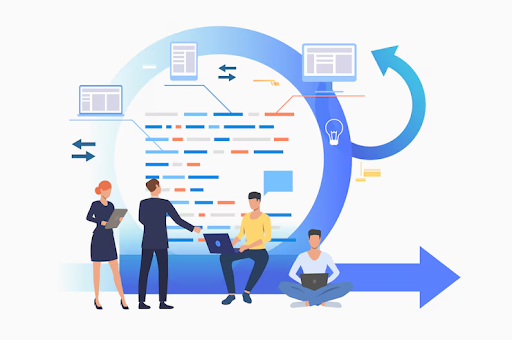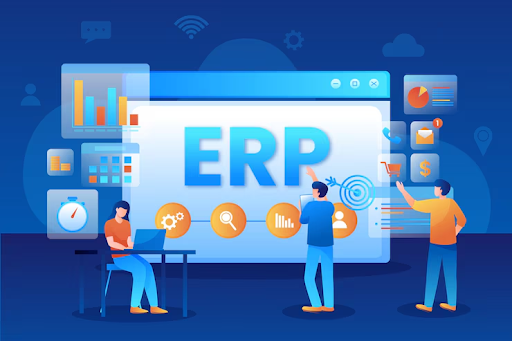Currently, ERP software (Enterprise Resource Planning) plays an indispensable role for all businesses, whether deployed on-premises or on the cloud, in order to maintain competitive advantage in a volatile market. However, alongside the system, the security aspect of the ERP system also needs to be prioritized. Enhancing the security of the ERP system will help businesses avoid risks such as cyberattacks, malware, or security incidents that disrupt operations.
To counter increasingly sophisticated cyber threats, businesses need to implement advanced security measures, combining effective data strategies with modern AI technology. This not only protects important information but also helps the system operate stably and continuously.
Therefore, securing ERP solutions is becoming one of the top strategic priorities. Many businesses are actively applying artificial intelligence (AI), blockchain, IoT... technologies to effectively and proactively prevent and mitigate risks.
In this article, we will delve deeper into how to protect the ERP system and accompanying data, while clarifying why this is an essential part of operating a modern business.
1. Introduction to the ERP system? What is ERP security solution?

The ERP (Enterprise Resource Planning) system is an integrated business management software that helps companies manage and automate various business processes within a single platform. The main purpose of ERP is to enhance efficiency and improve coordination between departments, thereby helping the business operate more smoothly.
Securing the ERP system (Enterprise Resource Planning) is the process of protecting the ERP system from cybersecurity threats, unauthorized access, data breaches, or any form of intrusion that could impact business operations.
The urgent need for security in the ERP system
In any business model, whether B2B or B2C, ensuring a safe and reliable user interface is a key factor in protecting the entire operational ecosystem. The ERP system – with its central role in enterprise management – not only integrates core functions but also connects various departments, creating a unified and efficient governance model. However, that extensive connectivity also makes ERP an attractive target for cyberattacks.
With the ability to store vast amounts of data – including financial information, personnel data, internal documents, and sensitive business information – any vulnerability in the ERP system can be exploited, causing serious damage to the business. The continuous increase in cybersecurity threats further underscores the urgency of investing in comprehensive security solutions.
The integration of artificial intelligence (AI), blockchain, IoT, etc., in ERP security is currently an advanced trend, allowing businesses to detect anomalies early, promptly prevent unauthorized access, and optimize data protection capabilities. Ensuring system security not only helps businesses operate stably but also creates a solid foundation to maintain the quality of products and services for end users.
2. Why is ERP data security solution important?

The ERP data security solution is extremely important because the ERP system is the "operational brain" of the enterprise – the place where all critical data is concentrated and all core activities are coordinated. Here are the specific reasons explaining why ERP security is a vital factor:
ERP contains sensitive and important data.
The ERP system stores a large amount of valuable information such as:
- Financial data (revenue, expenses, accounting reports)
- Human resources information (salary, contract, personal file)
- Customer and supplier information
- Data on production processes, inventory, supply chain
If this data is leaked, the business may face a loss of reputation, financial damage, and even legal violations (e.g., violations of personal data protection laws).
Attractive targets for hackers
ERP is a critical system, so it is often the primary target of cyberattacks such as:
- Ransomware (data encryption for ransom)
- Internal attack from disgruntled employees
- Stealing information for unfair competition
ERP system disruption = Business paralysis
If the ERP is attacked or goes down:
- Departments such as accounting, production, sales... are all affected.
- The supply chain may be disrupted.
- Unable to make quick decisions due to lack of updated data.
Weak security when unable to fully leverage AI & automation
Nowadays, modern ERP systems often integrate AI, machine learning, and automation technologies. But without a solid layer of security, these technologies will be exploited or fail to reach their full potential.
Directly impacts customer reputation and trust.
Customers and partners tend to withdraw if they know your system is vulnerable to attacks. A major security incident can take years for a business to regain trust.
3. Common security threats to ERP systems

External Cyber Attacks
ERP systems often connect to the internet or third-party systems, making them an attractive target for hackers. Common forms of attacks:
- Ransomware: Encrypting data and demanding a ransom.
- DDoS: Disrupting the system by "bombarding" it with traffic.
- Exploiting vulnerabilities in unpatched ERP software.
Insider Threats
Employees, administrators, or internal partners with access rights may inadvertently or intentionally leak, delete, or steal data. Typical:
- The account was abused after the employee resigned.
- Employees used excessive access rights to view sensitive data.
System misconfiguration
Incorrect or loose system setup leads to serious vulnerabilities:
- Granting overly broad access permissions.
- No access restrictions from unidentified IP addresses.
- Not enabling encryption or not using a firewall.
Weak authentication and authorization
Using weak passwords, lacking two-factor authentication, or not clearly separating user permissions can all create "gateways" for malicious actors to gain unauthorized access to the system.
Lack of software updates and patches
Many organizations are slow to update their ERP software, inadvertently leaving security vulnerabilities that hackers can easily exploit.
Phishing and email spoofing attacks
ERP systems often integrate with email. Hackers can send spoofed emails from suppliers, customers, or internal systems to steal login credentials or install malware.
Third-party integration is not secure
Connecting ERP with external software (CRM, HRM, payment...) can create vulnerabilities if the third party does not have standard security mechanisms.
Lack of monitoring and security alerts
If there is no user behavior monitoring system, access logs, and threat detection tools, attacks will be difficult to detect until damage has occurred.
4. Effective ERP security measures

Implement strong authentication mechanisms
One of the first and most important steps is to establish secure system authentication methods. Limiting access rights and closely verifying user identities will help you prevent the risk of information leaks from both inside and outside. Some measures that need to be implemented include:
- Regularly scan and check the system to detect malware or dangerous malicious code.
- Absolutely do not open any files or folders of unknown origin.
- Configure access rights based on the principle of "least privilege."
Leverage AI technology in ERP updates
Modern ERP solutions are increasingly integrating artificial intelligence (AI) technology to enhance monitoring, detection, and rapid response capabilities to threats. Regularly updating the ERP system not only improves performance but also ensures you are always protected by the latest security technologies.
AI also helps analyze user behavior, detect anomalies, and automate security processes, thereby significantly reducing the risk of cyberattacks.
Apply multi-factor authentication (MFA)
To upgrade the level of protection, you should implement multi-factor authentication – an additional layer of security that effectively prevents unauthorized access. Depending on the needs, businesses can use various forms of verification, such as:
- Mobile device authentication (OTP)
- Verify with a CAPTCHA or reCAPTCHA security code.
- Send the verification code via email
- Enter the character code or security question
Combining multiple authentication factors helps mitigate the risk of unauthorized login attempts, especially when the ERP system is accessed remotely or through personal devices.
Role-Based Access Control (RBAC)
- Only grant permissions to users based on specific roles and functions within the organization.
- Prevent unauthorized individuals from accessing sensitive data.
- Apply the principle of "least privilege access."
Data Encryption
- Encrypting data at rest and in transit.
- Prevent data theft or alteration in case of a leak.
- Use strong encryption algorithms like AES-256.
Backup and Disaster Recovery
- Perform regular backups of the entire ERP system and data.
- Establish a recovery plan to ensure business operations are not interrupted in case of an incident.
User training on information security
- Employees are the "weak link" in the security chain.
- Organize regular training on cybersecurity, scam alerts, and incident response skills.
Periodic security audit (Security Audit & Pen Testing)
- Conduct vulnerability assessment and penetration testing.
- Help detect and fix promptly before being exploited in practice.
Maintain regular system updates
System updates not only improve performance, but more importantly, they carry security patches that help fix potential vulnerabilities. A system that is not regularly updated is easily targeted by attacks exploiting software bugs or misconfigurations.
If you are experiencing system interruptions, unauthorized access, or unstable software performance, it is very likely that the cause is due to not fully updating to the latest versions.
5. Conclusion
In the era of strong digitalization, when data is the most valuable asset of a business, protecting the ERP system is no longer an option – it is a necessity. From the potential risks in daily operations to organized cyberattacks, every security vulnerability can put businesses in a passive position. Therefore, investing in ERP security, combined with advanced technologies like AI, not only helps businesses mitigate risks but also creates a solid foundation for sustainable development in a competitive environment. Consider ERP security as a long-term strategy – not just a temporary solution.